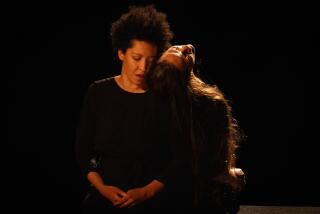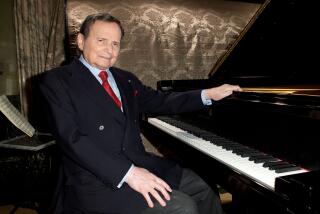Another American Pianist Invades Russia, Successfully
- Share via
It’s an ordinary student apartment in West L.A.: roommates, a few sticks of furniture, a sofa cobbled together of mismatched cushions in shades of orange and green (the originals were ruined by cats), a 13-inch color TV balanced on a USC-themed footstool held up by a goofy pair of stuffed human “legs” with a pair of Nikes on the feet.
And a Steinway grand piano.
This is the home of 24-year-old Robert Thies, jet-lagged but happy in an interview earlier this week after winning the gold medal at the Second International Prokofiev Competition in St. Petersburg, Russia’s Philharmonic Hall. Upon winning the prize last weekend over 15 other international competitors, Thies, who completed his master’s degree at USC in May, became the first American pianist to win the top prize in a Russian international piano competition since Van Cliburn took first place in the 1958 Tchaikovsky Piano Competition.
While the Prokofiev contest has yet to gain the prestige of the Tchaikovsky event, the prize marks a major coup for Thies, a student of USC’s Daniel Pollack, who won the bronze medal in the Tchaikovsky competition the same year Cliburn took the gold. Pollack, a renowned concert pianist, was among the international panel of judges but exempted himself from voting.
“It [the Prokofiev competition] is a very, very major world competition,” said Pollack by phone from Vienna this week. “The Prokofiev is on par with the Tchaikovsky, it just hasn’t been known as long. The demands of the repertoire and the program are exceedingly difficult.”
In a round of competitions that includes some four hours of playing, each competitor must include one Prokofiev sonata and one Prokofiev concerto. Thies played Sonata No. 6 and Concerto No. 2, both of which, according to Pollack, are noted for their rigor. Pollack said that the Russian audience rewarded Thies with rhythmic applause. “When they like something, they applaud with a beat in it, which means they love you--and they did that for Rob,” Pollack said. “It is the ultimate tribute.
“Russian audiences are very emotional. Here, audiences are very nice and polite. . . . There, they [won’t applaud] if they don’t feel it. If they don’t like you, they’ll even exit the hall. It’s a different philosophy.”
Of the 13 competition pieces he played in wintry St. Petersburg, the highlight for Thies was the concerto. “I’ve been working on the concerto for five years, and it has been my dream to play it with an orchestra,” he said. “And to play it with the orchestra in St. Petersburg was even better than I thought it would be.”
The special applause--and the $10,000 first prize--were major surprises for Thies, who decided to compete only six weeks before the event. Usually, pianists make that choice at least a year in advance. Thies made his 11th-hour decision during a three-month post-graduation tour of Europe. “I faxed my application in from Vatican City,” he said, laughing.
Luckily, Thies had been playing much of the repertoire for years. “I have worked on the music of Rachmaninoff, Prokofiev, Shostakovich,” Thies said. “The Russian composers seem to hit it home, so to speak, because they seem to musically depict the human soul and the human emotion more poignantly than other composers.”
Once the decision was made to enter, Thies spent six or seven hours a day “in front of that beast” (he gestured toward the big, black Steinway). “One of the reasons that I decided to do this competition is that I was away from the piano for so long, I was really inspired to get back, and I thought this would be a great motivator,” he said.
Thies was hesitant to describe what makes his work stand out among that of his peers, but when pressed, said: “My own feeling about my own playing--and from what friends and colleagues tell me--is that I have a sincere approach. I am in music because I love it, because it consumes me, not because someone told me I was good at it.
“There is a technical virtuosity that’s a given, but what you need beyond that is a sincere dedication and approach to your music. . . . In my mind, I try to have a clear distinction between an excellent pianist, and a musician.”
Born in Neptune, N.J., Thies began taking piano lessons at age 5, studying with various teachers as his family moved from city to city. He became serious about the instrument in his mid-teens under the tutelage of Robert Turner in Santa Monica when the family settled in Los Angeles.
While the Prokofiev prize includes recording and concert deals and offers, Thies still plans an already scheduled spring performance with Ami Porat and the Mozart Camerata in Newport Beach, and intends to enter more competitions, calling the next Tchaikovsky Competition a “possibility.”
“The competition is a pat on the back, saying you are doing the right thing, and keep going at it,” he said. “Because it is a fairly new competition, it doesn’t quite have the prestige of the Tchaikovsky, it can’t promise as many concerts or as many recordings quite yet.
“In other words, this competition is not going to make my career. But I think it’s a good start.”
More to Read
The biggest entertainment stories
Get our big stories about Hollywood, film, television, music, arts, culture and more right in your inbox as soon as they publish.
You may occasionally receive promotional content from the Los Angeles Times.










